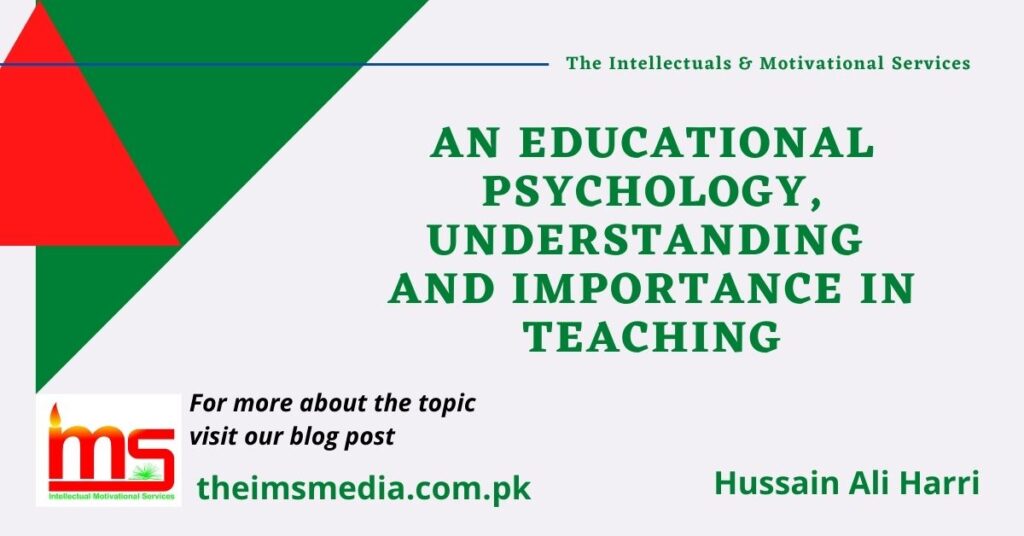
Introduction:
Educational psychology is an applied branch of psychology. It consists of the application of psychology principles and techniques to human behavior in educational situations to the development of education the development of educational strategies and programmers and to the solutions of educational problems as its stands today. Psychology is looked upon as a science like physics, Chemistry or biology. Secondly because of tremendous progress in knowledge in the last two centuries. We are today in a better position to think of psychology in more precise terms than was ever possible earlier.
As its stands today physiology is scientific study of human and animal behavior we have hardly and psychologist today who thinks of its study of the soul or mind there are reasons for this:
All though, education physiology has drawn a great deal upon the main field of physiology has for its techniques. Strategies and solution of problems of educations, yet as a science, it is merely a discipline made up of borrowed knowledge. It is a speed field of study in its own right. It has field of study in own data from its researches and investigations into the phenomena of interpersonal relationships, influences of home, school and peer group on a child’s developments, and intellectual mental (abilities) and non-intellectual factors of anxiety, level of aspiration also need for achievements, self-concept etc.)
Testing and Non-testing techniques:
In learning it has developed a large number of testing and non-testing techniques to measure achievements in various educational areas and of diagnosing weakness in learning. it has also developed detailed methodology of techniques of teaching various school subjects as well as special groups of students such as the gifted, the creative and the socially disadvantaged even the borrowed principles and law are applied only after testing there efficiency in real educational situations. Educational psychology revolves around three areas: the learner, the learning process, and the learning situations.
There details are given below:
The Learner:
In this area educational psychology studies the abilities needs and motivational forces, like self-concept, Life goals, Values. Anxiety of the individual learner as well as differences that exists among various individuals. This also includes the study of growth and development of the individual and the concept of maturity in various aspects of personality –physical, mental, social and emotional. Social behavior and social norms of this peer group, emotional health and problem behavior of the learner are also studied in the detailed from the mantel hygiene point of views.
The Learning process:
In the second areas, the learning process-educational psychology deals with the nature of learning and how it takes place. It explains the role and nature of re-enforcement, forgetting problems –solving transfer of training and the learning of skills, concepts and attitudes.
The learning situation:
In learning situation, educational psychology studies such factors as class room managements and discipline, techniques and aids which facilitate learning methods of teaching exceptional students, evaluation techniques, guidance and counseling.
Question like:
When to teach or what to teach? And how to teach is important in gathering data?
For this educational psychologist are more concerned with answers to that questions ,the first question refers to the development process that gradually mature as the child grows up. Similarly the problem of what to teach is important because of its close up relationships with the processor maturation.
We not thinking of teaching math’s to a three year old though he may be taught to counts simple things .The problem how to teach is equally important because there are ways and means to teaching which can make the education of a child more effective, meaningful and useful. An effort has been made in this unit is to highlight the significance of educational philology and its various methods used to make the teaching and learning process more effective and efficient.
Related links and Article Reflections for Pre-Primary Schools
Important links:
Presented by: Hussain Ali Harri
Prepared by: Meher Bano Harri
Important Note: This material is written for our academic notes which are published keeping in view the needs of other students.
This means that the content should be credited and the website referenced so that copyright principles are adhered to.
This material is in accordance with the curriculum of Allama Iqbal Open University Level M.Ed. So visit the University website for further study.
Full details of this content can be obtained by contacting us.


I am a website designer. Recently, I am designing a website template about our blog. The boss’s requirements are very strange, which makes me very difficult. I have consulted many websites, and later I discovered your blog, which is the style I hope to need. thank you very much. Would you allow me to use your blog style as a reference? thank you!
It’s our pleasure. Our website is only for educational purposes so you can use our posts or article material for education and research purposes but give reference to our website link. thanks
Thanks for shening. I read many of your blog posts, cool, your blog is very good.